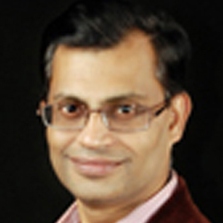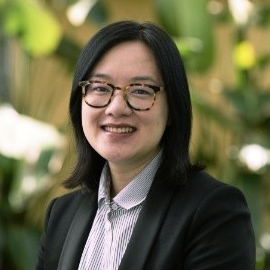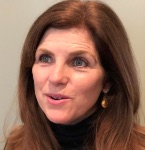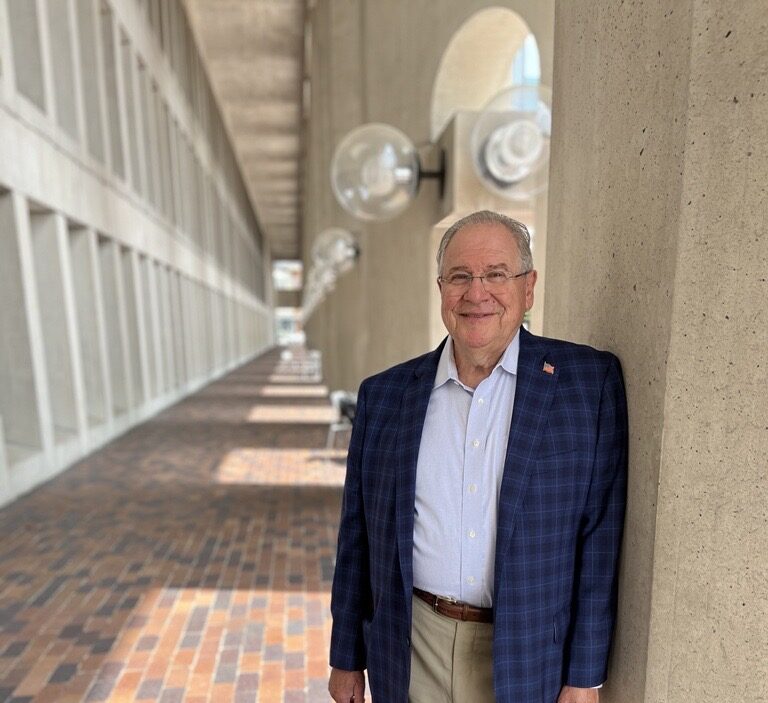Meet Our New and Promoted Faculty
This year, the College of Professional Studies welcomed eight new faculty colleagues and celebrated five faculty colleagues who earned a promotion, whose accomplishments are listed below.
The faculty of the College of Professional Studies create exceptional learning experiences that are essential to our students’ success. Along with that demonstrated excellence, the faculty also share a commitment to exploring new ways of responding to the changing needs of our students. Our faculty members’ ingenuity, expertise, and creativity in program and curriculum development prove that education can persist and even flourish during difficult times.
New Faculty

Dr. Ammar Aamer
Ammar Aamer, PhD, is an associate teaching professor in the Project Management program.
Dr. Aamer has more than 22 years of industry experience in project management, operations management, supply chain management and strategic business. He has served as a consultant on systems and processes including lean manufacturing, warehousing, six sigma, process and quality improvement and simulation modeling for numerous companies including Volvo, TRW Automotive, and Gap Inc. This included organizing and managing executive management training, developing capacity and asset-utilization models, and managing several continuous improvement projects.
Dr. Aamer has also served in various roles in education, including as assistant professor, associate professor, professor, and dean of the faculty of engineering and technology at Sana’a and Sampoerna Universities in Yemen and Indonesia. His publications include recent articles in the International Journal of Production Research, International Journal of Productivity and Performance Management, and Benchmarking: An International Journal. His research is currently focused on the areas of data analytics and supply chain management, artificial intelligence and project management, lean six sigma, change management, and the Internet of Things (IoT). Prior to his academic and business management roles, Dr. Aamer worked as a senior industrial engineer at Gap Inc.
Dr. Aamer earned his PhD in Industrial Engineering from the University of Tennessee in 2005. He has also achieved the Project Management Professional designation from the Project Management Institute. He lives in the greater Toronto area and teaches at Northeastern’s Toronto campus and online.

Dr. Noor Ali
Noor Ali, EdD, is an assistant teaching professor in the Graduate School of Education.
Dr. Ali has been a K-12 teacher for 15 years. She is the principal of Al-Hamra Academy, where her work has included mentoring faculty and students in bringing STEAM (science, technology, engineering, art and mathematics) -based experiential learning to the school. In this role she has also led initiatives focused on civic engagement among marginalized populations focused on social justice.
Dr. Ali’s writing on social justice, marginalization, leadership and curriculum has been published in academic journals including Follow The Leader and popular media outlets such as the Teach Better blog. Her book, Critical Storytelling: Narratives of Muslim American Youth, is forthcoming this fall from Brill/Sense. Her research interests include Critical Race Theory (CRT), and she has coined a CRT subset, MusCrit. She has extensive experience with citizen science, youth civic engagement, social justice and equity and interfaith initiatives.
Dr. Ali is a member of the Diversity, Equity, and Inclusion Taskforce for the Town of Shrewsbury, Massachusetts, and has served as a board member on the Shrewsbury Youth and Family Services, an organization that supports mental health. She has also worked extensively with the New England Association of Schools and Colleges (NEASC) and serves on the Accreditation Commission of Independent Schools.
Dr. Ali earned her EdD from Northeastern in 2018. She lives in the greater Boston area and teaches at Northeastern’s Boston campus and online.

Jim Giumarra
Jim Giumarra is an associate academic specialist and faculty lead for the Mechatronics Engineering program.
Professor Giumarra previously served as department chair for electronics engineering technology and chair of the mathematics and physics department at Benjamin Franklin Institute of Technology, where he led the continuous improvement plan to ensure the relevance, sustainability and growth of the programs in the electronics department, developed a hybrid automation/robotics course curriculum fusing online instruction and an in-person lab model, and served as the sole faculty member on the school’s President’s Advisory Council. In addition, he was selected for the National Science Foundation (NSF) Research Experience for Teachers program to learn about Robotics and Controls at Texas A&M University and for the NSF-sponsored 20-hour “Revamping Robotics Education” workshop at Michigan Technological University, where he earned a certification as an instructor on the Fanuc industrial robot.
Prior to entering the education field, Professor Giumarra spent almost a decade in science research and engineering, most recently at Janis Research Company, where he designed custom cryogenic vacuum systems based on experimental requirements; expanded system design to include options for automation, vibration isolation, optical testing, in-situ magnetic field testing, and an in-situ device-feature measurement system; and developed and constructed control circuits for low-temperature test systems.
Professor Giumarra earned his master of science in electrical engineering and computer science from the University of Illinois in 2000. He lives in the greater Boston area and teaches in Boston and online.

Dr. Umesh R. Hodeghatta
Umesh R. Hodeghatta, PhD, is an assistant teaching professor in the Analytics program.
An engineer, a scientist and an educator, Dr. Hodeghatta specializes in analytics, machine learning, deep learning, natural language processing, and cyber security. Dr. Hodeghatta has more than 25 years of experience in technical and senior management positions at AT&T Bell Laboratories, Cisco Systems, McAfee, and Wipro. As a data scientist, he helps business leaders arrive at data-driven decisions linked to their organizations’ strategies and financial goals. He has served in numerous professional organizations and regulatory bodies—including as senior technical advisor to the Government of India.
Dr. Hodeghatta previously served on the faculty of Kent State University in Ohio and the Xavier Institute of Management in Bhubaneswar, India, where he designed and taught courses. He was instrumental in setting up a high-speed optical network and data center with the integration of telephony and data in XUB. He has published in international journals and conference proceedings on topics ranging from “How to Build Chat-Bots Using Machine Learning and NLP” to “Can AI and Privacy Co-Exist?” Also, he is the author of two books: Business Analytics Using R: A Practical Approach and The InfoSec Handbook: An Introduction to Information Security published by Springer Apress. He also is a senior member of the Institute of Electrical and Electronics Engineers (IEEE).
Dr. Hodeghatta earned his master’s degree in electrical and computer engineering from Oklahoma State University and his PhD from the Indian Institute of Technology Kharagpur in 2015. He lives in the greater Boston area and teaches in Portland and Boston and online.

Dr. Megan Kennedy
Megan Kennedy, PhD, JD, is an assistant teaching professor in the Doctor of Law and Policy Program.
Dr. Kennedy served for six years as assistant district attorney in Norfolk County, Massachusetts, working in both district and superior courts. As a criminal prosecutor, she focused primarily on cases of family violence and sexual assault, earning both the Spotlight Award and the District Court Prosecutor of the Year award.
Dr. Kennedy joined Northeastern in 2018 as a lecturer in the Doctor of Law and Policy program, teaching courses on law and legal reasoning, research methods, qualitative methods and law and policy concepts. Her research interests include courts and the decision-making of court actors; victims of crime; policy and legal reform; and research methods. She has published articles on the processing of court cases, the harsh sentencing of juveniles, and the dynamics of misdemeanor plea bargaining. In her current role, she is responsible for the research methods curriculum, student thesis advising, and teaching. Her prior teaching roles include positions at Southern New Hampshire University and the State University of New York at Albany (UAlbany).
Dr. Kennedy earned her law degree from Gonzaga University School of Law in 2002 and her PhD from the School of Criminal Justice of UAlbany in 2018. A member of the American Society of Criminology and the Law and Society Association, she is also licensed to practice law in Massachusetts. She lives in Seattle and teaches in Seattle and Boston and online.

Dan Koloski
Dan Koloski is professor of the practice in the Analytics program and director of professional studies at the Roux Institute at Northeastern University in Portland, Maine.
Professor Koloski joined Northeastern after spending more than 20 years in the IT and software industry, working in both technical and business management roles in companies large and small. This included application development, product management and partnerships, and helping lead a spin-out and sale from a venture-backed company to Oracle. Most recently, Professor Koloski was vice president of product management and business development at Oracle, where he was responsible for worldwide direct and channel go-to-market activities, partner integrations, product management, marketing/branding and mergers and acquisitions for more than $2 billion in product and cloud-services business. Before Oracle, he was CTO and director of strategy of the web business unit at Empirix, a role that included product management, marketing, alliances, mergers and acquisitions and analyst relations. He also worked as a freelance consultant and Allaire-certified instructor, developing and deploying database-driven web applications.
Professor Koloski’s previous work experience focused on the application of advanced analytical techniques to software testing, IT operations and cyber security. His teaching is focused on building the next generation of data citizens across the technical and business spectrum through delivery of technical and experiential education courses to graduate students. Professor Koloski directs the professional programs faculty team at the Roux Institute and delivers a variety of lifelong learning experiences for Northeastern industry partners.
Professor Koloski holds a bachelor’s degree from Yale University and earned his MBA from Harvard Business School in 2002. He lives in the greater Portland, Maine, area and teaches at the Roux Institute Portland campus and online.

Dr. Yvonne Leung
Yvonne Leung, PhD, is an assistant teaching professor in the Analytics program.
Dr. Leung previously served as an assistant professor in the Department of Psychiatry at the University of Toronto. She is also a scientist at the University Health Network, the largest research institute in Canada, where she designs and evaluates artificial intelligence (AI)-based psychosocial and supportive care services for cancer patients to improve quality of life and access to care.
Dr. Leung has more than 15 years of experience in psychosocial and mental health research and has secured over C$880,000 in personal awards and research funding as a principal investigator and over half a million dollars as a co-investigator. She has published 39 peer-reviewed journal articles in psychosocial care and health services research.
Currently, Dr. Leung is leading two projects using machine learning-based natural language processing algorithms to assist online support group therapists in tracking real-time participant progress and to develop Chatbot solutions for automated self-care support tailored to patients with metastatic breast cancer. Her expertise encompasses administrative databases, patient-reported outcomes, psychometrics, advanced statistical techniques including machine learning, trajectory analysis, latent structure analysis, and cluster analysis. She is also knowledgeable in qualitative analytic methods such as grounded theory and thematic and content analysis, as well as in interpretive descriptive methods. Among the courses she has taught are “Introduction to Statistics,” “Research Methods,” “Survey Methods,” and “Exploratory and Confirmatory Factor Analysis” to both healthcare professionals and senior analysts.
Dr. Leung earned her PhD in kinesiology and health science from York University in Toronto in 2011. She lives in the greater Toronto area and teaches at the Toronto campus and online.

Dr. Shanu Sushmita
Shanu Sushmita, PhD, is an assistant professor in the Analytics program.
Shanu Sushmita, who specializes in machine learning, data mining, information retrieval and health analytics, has worked for more than a decade as a researcher and teacher of computer science at the undergraduate and graduate levels. Most recently, she was an affiliate assistant professor at the University of Washington, Tacoma, School of Engineering and Technology, concurrently holding a faculty position in the Master’s in Business Analytics program at Milgard Business School at UW, Tacoma.
Previously, Dr. Sushmita was head of data science at KenSci, a Seattle healthcare company that provides AI platform for digital health and healthcare solutions. Her role included strategic planning, designing a vision for data science and managing a team of data and research scientists to demonstrate how healthcare payers and providers could use data and analytics to improve and standardize clinical care, reduce costs, achieve population health goals and make better strategic decisions for their organizations.
Dr. Sushmita’s research interests include applications of machine learning, information retrieval and utilizing data to improve user experience. In the course of her doctoral studies at the University of Glasgow, she taught courses in data science, analytics and natural language processing, and she has published on topics in healthcare, social media, artificial intelligence (AI) and information retrieval.
Dr. Sushmita holds a B.E in Computer Science from North Maharashtra University and a Ph.D. from the University of Glasgow in Computer Science. She lives in the greater Seattle area and teaches in Seattle and online.
Promoted Faculty
Congratulations to five faculty members of the College of Professional Studies who have been promoted. The following faculty members have been recognized for their excellence in teaching and curriculum development. Promotion also recognizes their contributions to the college and university through their leadership, service, educational innovation, discovery and professional engagement in their fields.

Dr. Christopher Bolick
Christopher Bolick, EdD, has been promoted to associate teaching professor in the project management program.
Dr. Bolick, who has served at Northeastern since 2013 as a part-time faculty member, as a full-time faculty member and currently as faculty leader, brings extensive experience with a Fortune 40 company in project management and business process improvement.
In his role as lead faculty for the project management programs, Dr. Bolick has worked to establish faculty onboarding as well as faculty mentoring and support, as the program has grown in size and quality across six regional campuses. He was one of the first faculty members to pilot livecast teaching from the Charlotte campus to Boston, and Project Management under his leadership was the first program to be fully mapped as competency-based, allowing further development at the modular level and opening the door to badging and stackability for students through prior learning assessments. He has also served as chair of the CPS Academic Programs Committee, which oversees and shepherds all new program and program changes across all academic areas in CPS.
Dr. Bolick has taught graduate courses including “Project Foundations,” “Project Cost & Scheduling,” “Project Evaluation,” “Special Topics,” and “Project Capstone” in addition to partnering with organizations in the nuclear, pharma and municipalities fields to assess workforce needs and deliver certificates, multi-day workshops and credit-bearing courses. He presented at the Project Management Institute’s 2018 Technology and Talent Symposium and has co-authored a chapter in the areas of artificial intelligence, data analytics, and digital transformation as related to project management practices.
Dr. Bolick earned his EdD from Northeastern University in 2020.

Dr. Kelly J. Conn
Kelly J. Conn, PhD, has been promoted to teaching professor in the Graduate School of Education.
Dr. Conn has been a full-time faculty member since 2012. Informed by her previous career in laboratory science, she has developed and taught courses on science, technology, engineering and math (STEM) education including “Current and Emerging Practices in STEM Education” and “National and International Benchmarks in STEM Education.”
Dr. Conn is currently collaborating on a project to develop and expand experiential learning in elementary and secondary school classrooms by creating curriculum for the Network for Experiential Teaching and Learning (NExT). In this role, Dr. Conn has developed and taught courses for the Graduate Certificate in Experiential Teaching and Learning and serves as faculty lead for the Master’s of Education program in Learning and Instruction. She also teaches in the Doctor of Education program and serves as dissertation chair to several students.
Dr. Conn coauthored a book commissioned by the College of Professional Studies, The Lowell Institute School at Northeastern University (2015), and was lead science consultant to the Abakhokeli Project, a joint science-teacher-training effort of Northeastern and South Africa’s Western Cape Education Department. She has also served as the regional lead faculty member for the EdD program in Hong Kong.
Dr. Conn currently serves as co-investigator of a multi-year National Science Foundation grant that explores experiential, industry-connected learning experiences for high school students to foster interest and preparation for STEM careers.
She earned her PhD in biochemistry from Boston University in 1999 and has done postdoctoral work in neuroscience.

Dr. Shaunna Harrington
Shaunna Harrington, PhD, has been promoted to teaching professor in the Graduate School of Education.
Dr. Harrington teaches in the master’s programs in the Graduate School of Education, and also teaches and advises undergraduates in the PlusOne program, which allows students to begin working toward their Master of Arts in Teaching degree while completing their bachelor’s degree. She has taught courses on curriculum, instruction, and assessment, and on the history of K12 and higher education, and was the long-time faculty lead for the master’s programs foundation course, “Culture, Equity, Power and Influence.” Dr. Harrington has served on a variety of internal committees including the College of Professional Studies Joint Task Force on Faculty Workload and the Faculty Performance Review and Merit Pay Task Force. She currently serves as the board president for the Massachusetts affiliate of the Association for Supervision and Curriculum Development.
Dr. Harrington began her career as a middle school social studies teacher in the Boston Public Schools and has continued to focus her teaching and activism on equity and justice education. She has been engaged in action research focused on teaching social justice in online settings and on deepening equity practices in teacher education. She also researches the history of education and has presented on a variety of topics from community schools created by Black parents and activists in Boston in the 1960s to American colonial education in the Philippines in the early 20th century. She served as a Humanities Scholar on the public history project, The Long Road to Justice, which documents how African Americans have sought racial justice in the Massachusetts courts.
Dr. Harrington earned her PhD in history at Northeastern in 2019.

Dr. Kristen Lee
Kristen Lee, EdD, has been promoted to teaching professor in the behavioral science programs.
Since her full-time appointment in 2013, Dr. Lee has taught courses including “Engaging Diversity and Difference,” “Stress and Its Management,” “Assessing your Leadership Capability,” “Group Dynamics and Interpersonal Conflict,” and has advanced Northeastern’s mission in a wide variety of ways. A pioneer in developing the college’s Experiential Network (XN) model and an innovator with the PlusOne stackable credential model, she is lead faculty member in behavioral science within the college’s Healthcare and Biotech domain, serves as faculty-in-residence in International Village, and earned the 2012 Excellence in Teaching Award. Her leadership on mental health and resilience has significantly shaped the university’s approaches to supporting students.
Dr. Lee also serves as a Global Resilience Institute Faculty Affiliate. Active on campus and in the media as an advocate for global mental health, Dr. Lee is a frequent conference presenter and author. Her 2014 book, Reset: Make the Most of Your Stress: Your 24-7 Guide for Well-Being, won Motivational Book of the Year in the Next Generation Indie Book Awards. She is also the author of Mentalligence: A New Psychology of Thinking: Learn What it Takes to Be More Agile, Mindful and Connected in Today’s World, and the upcoming Worth the Risk: How to Microdose Bravery to Grow Resilience, Connect More, and Offer Yourself to the World, and the Rethink Your Way to the Good Life column for Psychology Today. Her TEDx talk, “The Risk You Must Take” has been viewed more than 311,000 times.
A Licensed Independent Clinical Social Worker, Dr. Lee speaks and consults globally on resilience, has shared her expertise as a grant reviewer for U.S. federal agencies for more than two decades, and has spoken at more than 40 events across the university.
Dr. Lee earned her EdD in Organizational Leadership Studies at Northeastern in 2011.

Dr. Corliss Thompson
Corliss Thompson, PhD, has been promoted to teaching professor in the Graduate School of Education.
Since her full-time appointment in 2013, Dr. Thompson has taught research methods, research design, and social justice courses, including “Culture, Equity, Power, and Influence,” “Research Design,” and “Qualitative Research Methods.” Her work centers on her commitment to diversity, equity, and inclusion, and she has contributed significantly to the development of NExT, the Network for Experiential Teaching and Learning, serving as a panelist and creating materials and workshops.
Dr. Thompson is passionate about using culturally relevant and experiential approaches in her teaching and mentoring. She uses research methodology and program evaluation approaches for deeper understanding and improvement of teaching and learning and helps colleagues and students employ the same approach. Dr. Thompson is currently principal investigator on a 2019 National Science Foundation grant focused on experiential learning in science, technology, engineering and mathematics (STEM) for high school students. She has also served on a number of committees in the College of Professional Studies and the university, such as the Provost Search Committee, and she presents on topics of diversity, equity and inclusion across the university and beyond.
Before becoming a faculty member, Dr. Thompson worked in a research and evaluation office in a school district in North Carolina and at the University of North Carolina, where she earned her doctoral degree. She also was an elementary school teacher in Charlotte and Chapel Hill, NC.
Dr. Thompson earned her PhD in Educational Research from the University of North Carolina at Chapel Hill in 2013.




